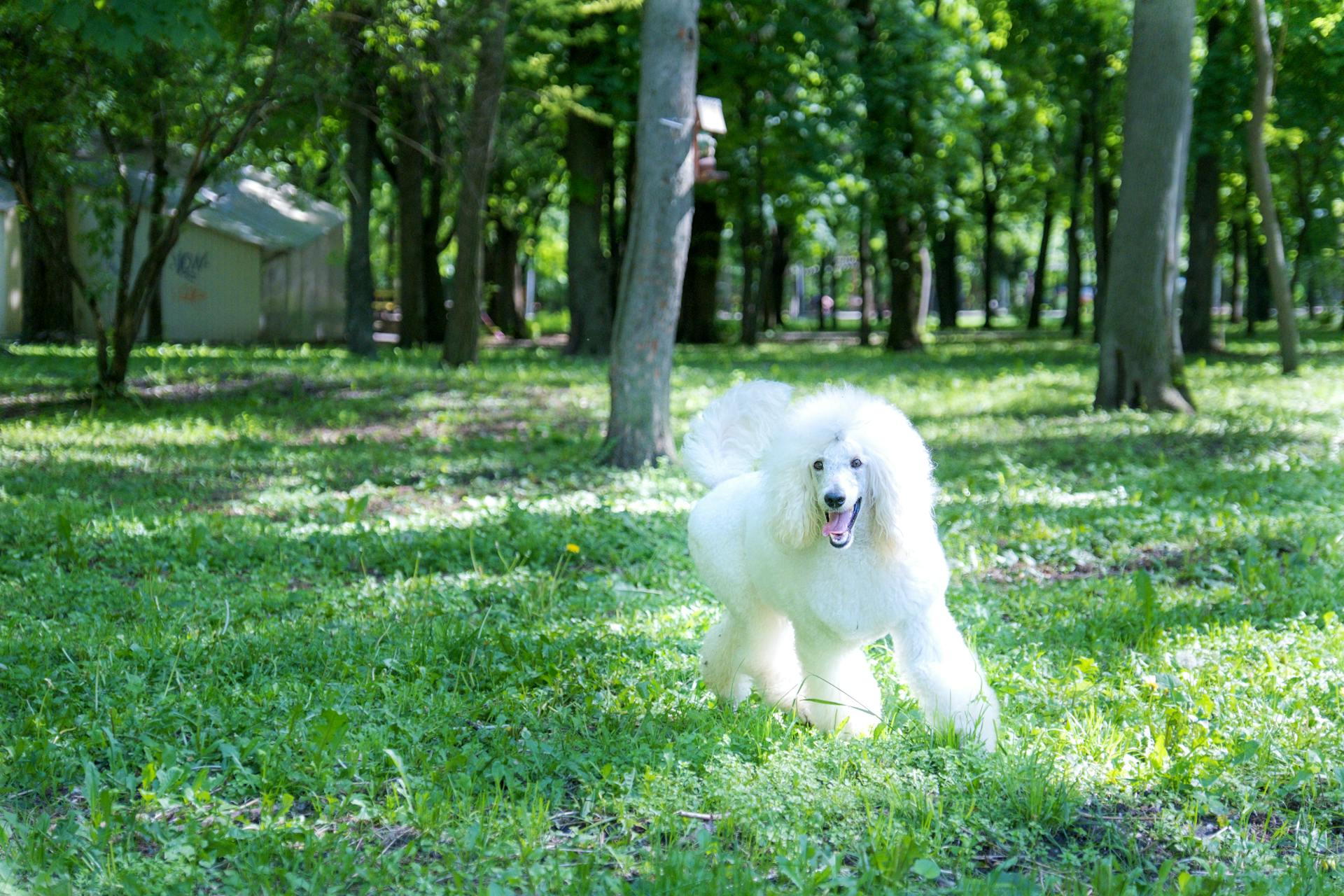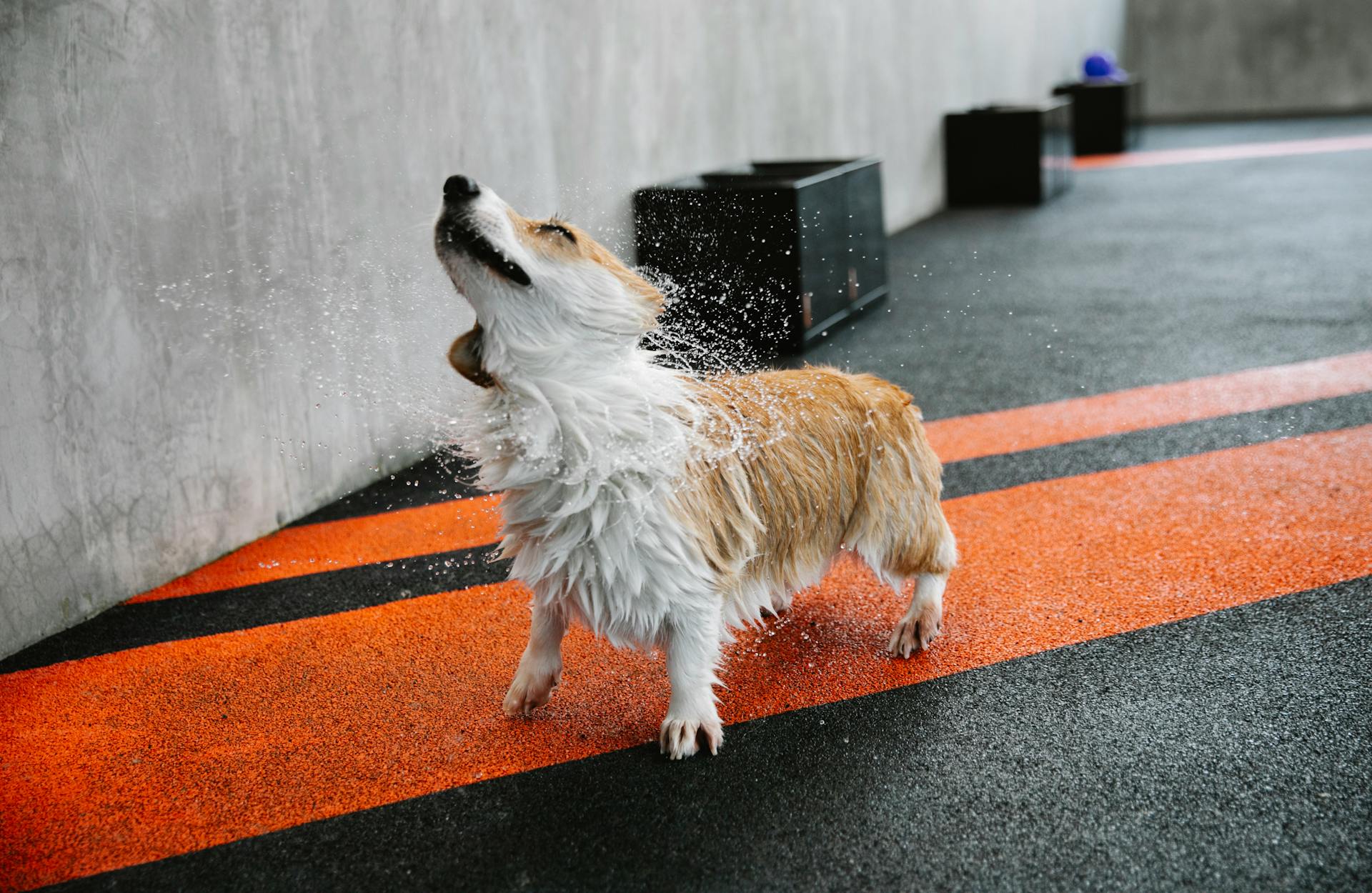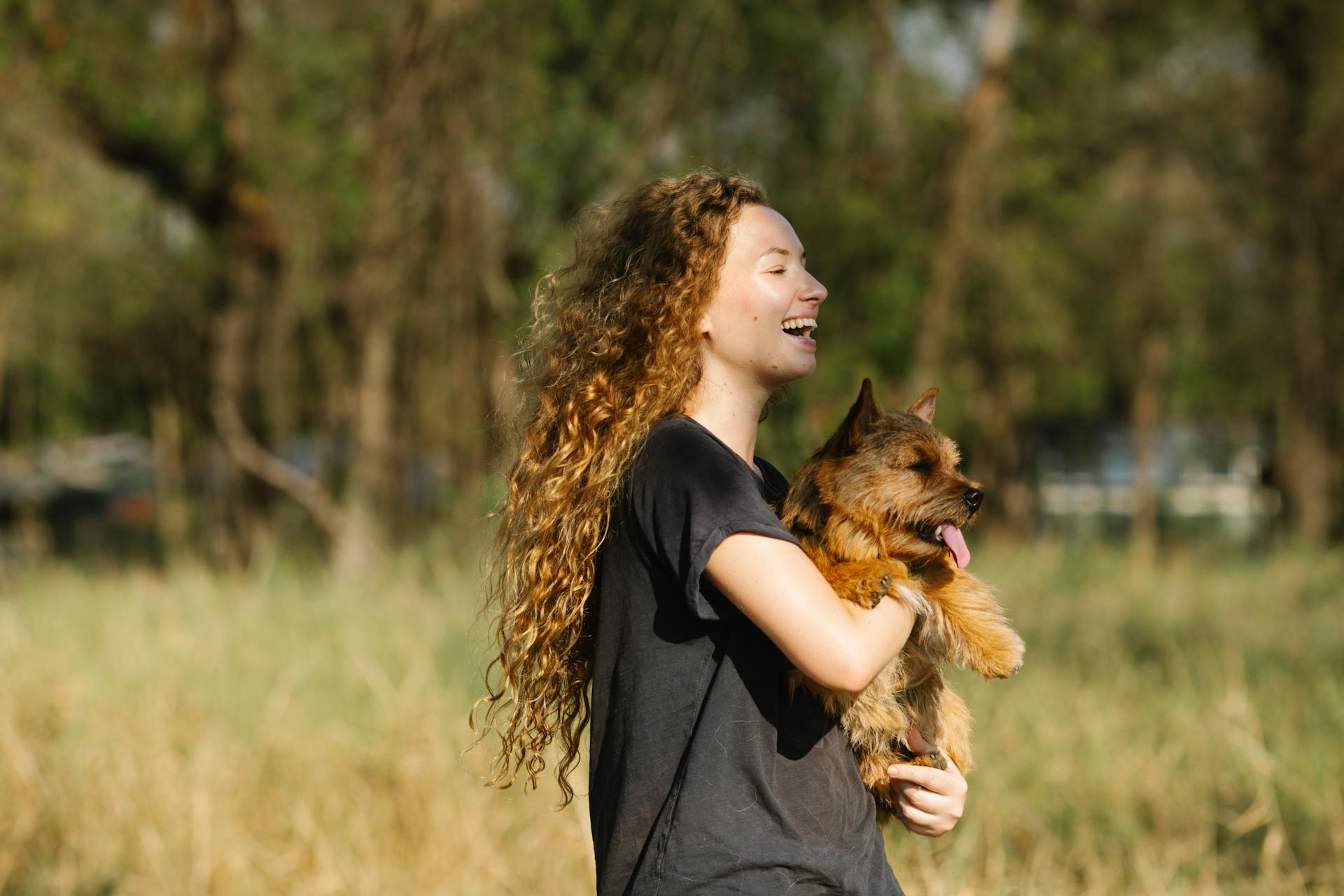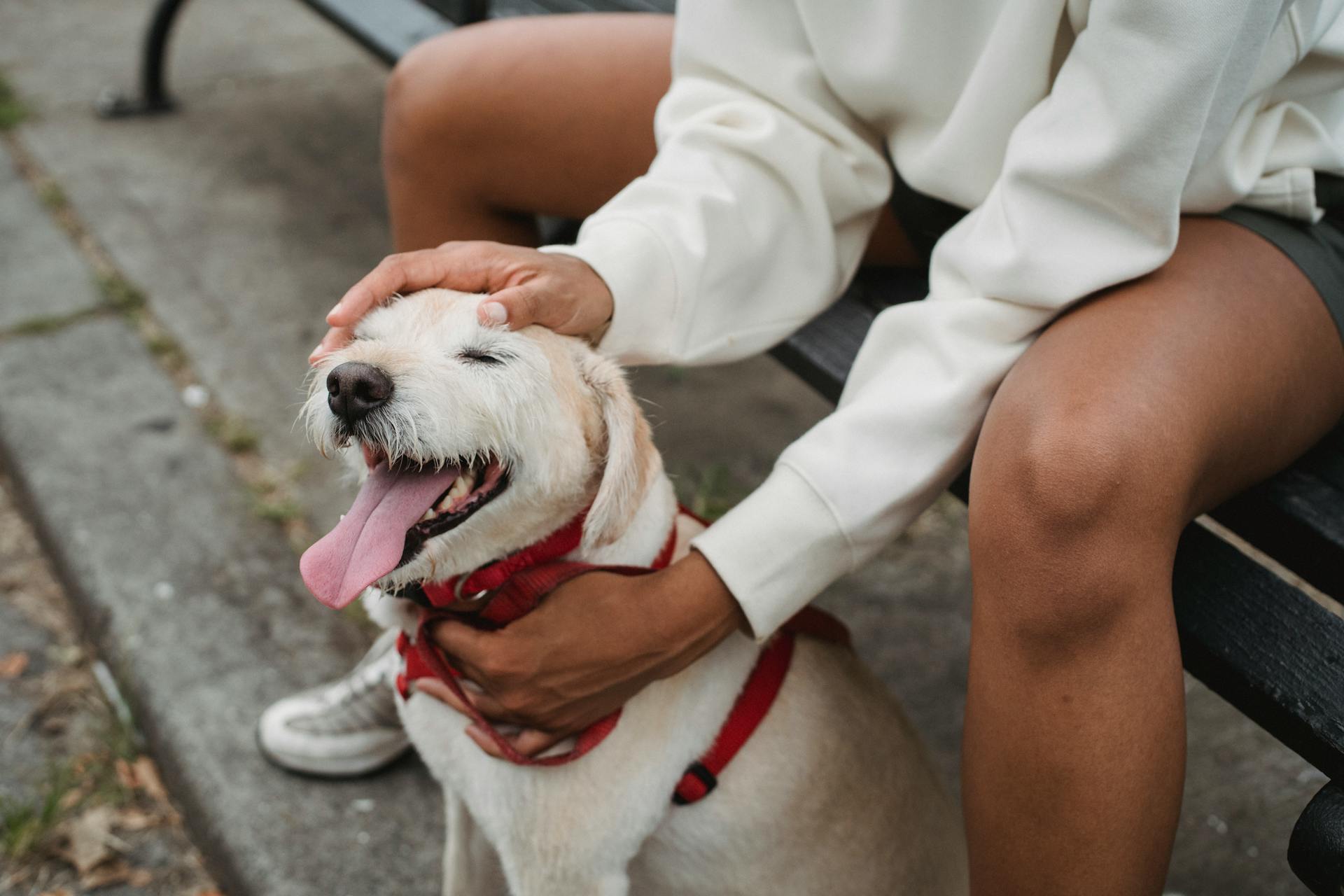
It's not uncommon for Maltipoos to shake, and it's often a sign of excitement or anxiety. They can get overstimulated easily, especially in new environments.
Maltipoos are a cross between a Maltese and a Poodle, which means they can inherit traits from both breeds. This mix of breeds can make them prone to certain health issues, like low blood sugar, which can cause shakiness.
If your Maltipoo is shaking, it's essential to check their temperature, as they can be sensitive to heat. A temperature above 80°F (27°C) can be uncomfortable for them.
Their small size also makes them more susceptible to cold temperatures, so it's crucial to keep them warm and cozy, especially in cold weather.
If this caught your attention, see: How Cold Can Alaskan Malamutes Handle
Causes of Shaking
If your Maltipoo is shaking, there are several possible causes to consider. Chronic kidney failure can lead to tremors in dogs, as can neurological problems.
Shaking can be a normal response to fear or cold, and it typically stops when your dog warms up or is removed from a stressful situation. However, if your dog is shaking suddenly and for no apparent reason, they need to be seen by their veterinarian immediately.
Age-related tremors are non-aggressive and don't harm your dog, but only a veterinarian can determine these results through testing to rule out all other causes. I've seen older dogs with age-related tremors, and with proper care, they can live happy and healthy lives.
Interrmittent leg tremors can be caused by weakened leg muscles or a chemical or neurological imbalance, which can be more serious. This can interfere with your dog's mobility, making it difficult for them to walk or stand.
Shaker syndrome is a congenital nerve defect in the brain and spinal cord that causes tremors in the head and whole body. This condition most commonly occurs in breeds like the Maltese, Poodle, and West Highland Terrier, and tremors usually begin when a dog reaches adulthood.
Here are some possible reasons for your Maltipoo's shaking, in no particular order:
- Chronic kidney failure
- Neurological problems
- Age-related tremors
- Interrmittent leg tremors
- Shaker syndrome
- Fear or cold
- Anal sac issues
- Underactive adrenal gland
- Demyelinating disorders
If you're unsure about your dog's shaking, it's always best to consult with a veterinarian for a proper diagnosis and treatment plan.
Symptoms and Signs
Tremors in your Maltipoo can be a sign of a serious issue, such as toxin ingestion or epilepsy, especially if they come on suddenly and affect the entire body.
If your Maltipoo's tremors are confined to the rear legs and only occur when they try to manipulate these limbs, it's likely a non-emergency situation, but still concerning.
Degenerative myelopathy is a possible cause of rear leg tremors in Maltipoo, especially if they're accompanied by knuckling in the rear feet or a swaying hindquarters.
Tremors in puppies or adolescent Maltipoo can be a sign of a serious infection like distemper.
As Maltipoo age, tremors can be a symptom of age-related complaints like osteoarthritis, often accompanied by stiffness or lameness.
Hip dysplasia, a condition present from birth, can take years to affect a Maltipoo's steadiness, leading to tremors.
Some breeds, like Maltese and West Highland White Terriers, are prone to a condition called generalized tremor syndrome, or GTS, for no obvious reason.
Shaking can be a sign of pain in dogs, often exhibited through shaking in the hind legs, common in older dogs with joint pain.
Arthritis is one reason for shaking from pain in dogs, and your veterinarian can help address your pet's pain through medication or therapies.
What to Do If My Dog Is
If your Maltipoo is shaking, it's essential to rule out any underlying medical issues that could be causing the problem. Chronic pain, muscle weakness, or neurological dysfunction can affect the strength and stability of their rear legs.
Your veterinarian can prescribe medication or other treatments to cope with an underlying metabolic imbalance. They may also recommend a special diet to combat obesity, which can aggravate the condition by placing additional stress on the rear legs.
Regular exercise can still help to reverse or reduce atrophy in weakened leg muscles, even if your dog has a neurological problem like degenerative myelopathy. However, some neurological problems currently have no known cure.
Conservative options for treating degenerative joint problems include anti-inflammatory drugs and foods, massage therapy, light exercise, and ergonomic changes around the house.
For another approach, see: How Much Exercise Does a Cavapoo Need
Medical Conditions
A veterinary neurologist should check your Maltipoo if their shaking legs make it difficult to walk or stand.
Shaking legs can indicate weakness or disruption in communication from the spinal cord to the brain. This can be a sign of various neurological conditions in both dogs and cats.
Some medical conditions that can cause shaking legs in dogs include weakened leg muscles, a chemical or neurological imbalance, or even a slipped disc or nerve problem.
A dog's legs can shake due to age-related tremors, which are non-aggressive and don't harm your dog. However, only a veterinarian can determine this through testing to rule out all other causes.
Intermittent leg tremors can be caused by weakened leg muscles or a chemical or neurological imbalance, which can be more serious. Not only can the movement scare your dog, it can interfere with their mobility, making it difficult for them to walk or stand.
Here are some potential causes of shaking legs in dogs:
- Weakened leg muscles
- Chemical or neurological imbalance
- Slipped disc or nerve problem
- Age-related tremors
When to See a Vet
If your Maltipoo is shaking, it's essential to consider contacting your veterinarian. If the trembling is not caused by an environmental factor, such as stress due to a new person in the home.
Look out for additional symptoms that may accompany shivering, including lethargy, limping, diarrhea, vomiting, anxiety, drooling, and panting. These symptoms can indicate a more serious issue.
If your dog continues to shake for more than an hour, take them to the vet immediately. The sooner your dog is assessed, the higher the chances of a positive outcome.
If you suspect your dog has ingested a potential toxin, seek veterinary attention right away. This is a critical situation that requires prompt action.
Here are the warning signs that warrant a vet visit:
- Lethargy
- Limping
- Diarrhea
- Vomiting
- Anxiety and signs of distress
- Drooling
- Panting
Anxiety
Anxiety is a common issue in dogs, and your Maltipoo may be experiencing it due to loud noises like thunder or fireworks, which can cause them to shiver and shake.
Dogs may have anxiety, especially when major environmental changes occur in their space.
It's not uncommon for dogs to react with anxiety to loud noises, so if you suspect your Maltipoo is experiencing this, you may want to contact your veterinarian for guidance.
Your veterinarian can prescribe an anti-anxiety medication for your dog to be used in anticipation of or during stressful events, which can help alleviate their anxiety.
If your dog's anxiety is severe, it's best to seek professional help to ensure their well-being.
You might like: Maltipoo Separation Anxiety
Environmental Factors

Environmental Factors can play a significant role in your Maltipoo's shaking.
Temperature extremes can cause your Maltipoo to shake. This is because they have a thick coat of fur that can make them prone to overheating in warm temperatures, and their small size makes them more susceptible to cold temperatures.
Changes in humidity can also cause your Maltipoo to shake. Maltipoos are sensitive to humidity, and can develop skin issues if the air is too dry or too humid.
Weather conditions like thunderstorms can cause your Maltipoo to shake due to the loud noises and flashes of lightning. This is a common phobia in dogs, known as astrophobia.
Air quality can also affect your Maltipoo's behavior, and poor air quality can cause them to shake. This is because they are more sensitive to pollutants in the air than humans are.
Curious to learn more? Check out: Do Goldendoodles Have Sensitive Stomachs
Leg Health
If your Maltipoo is shaking, it's essential to consider the possibility of leg health issues. Shaking can be a sign of pain, especially in the hip or knee, from a degenerative joint condition like osteoarthritis or hip dysplasia.
Some common causes of shaking in dogs include electrolyte imbalances, toxin ingestion, and neurological disorders. Degenerative myelopathy, a progressive thinning of the protective myelin sheath, can cause hind leg weakness and tremors, especially in breeds like German Shepherds, Collies, and Siberian Huskies.
Your veterinarian can prescribe medication or other treatments to cope with an underlying metabolic imbalance or chronic pain. Conservative options for treating degenerative joint problems include anti-inflammatory drugs and foods, massage therapy, light exercise, and ergonomic changes around the house.
Here are some potential causes of shaking in dogs, categorized as "benign" or normal:
- Whole body shaking - typically from fear or cold that stops when your dog warms up or is removed from a stressful situation.
- Age-related tremors - non-aggressive tremors that don’t harm your dog caused by old age.
- Hind leg weakness - shaky legs and muscle spasms are common in dogs with weak back legs.
Less Severe Situations
Some dogs may shake due to excitement, anxiety, or being cold, but these situations are generally less severe and can be handled without a vet's help.
If your dog is shaking due to excitement, it's likely because they're overstimulated or eager to play. This is especially common in breeds that are prone to shivering, such as certain smaller breeds.
Recommended read: Maltipoo Mixed Breeds
To calm your dog in these situations, try giving them a safe space to retreat to, like their bed or crate, where they can feel secure and relaxed.
Distracting your dog with toys, treats, and games can also help soothe them when they're feeling anxious or overexcited. Long-lasting treats and puzzle games can keep them occupied and calm.
A calm and predictable daily routine can also help reduce your dog's stress and anxiety levels, making them feel more confident and secure. This includes regular exercise, consistent meal times, and a steady sleep schedule.
Are My Dog's Back Legs Healthy?
Dogs can experience shaking or trembling in their back legs due to various reasons, not all of which are cause for alarm.
Cold weather can cause your dog to shiver, and electrolyte imbalances can also cause shivering or trembling. Your veterinarian can help determine the cause and recommend treatment.
Some common causes of shaking in a dog's back legs include degenerative joint problems, such as osteoarthritis and hip dysplasia. These conditions can cause chronic pain and lead to shaky legs and tremors.
Related reading: Weiner Dog Back Brace
If your dog experiences chronic tremors that worsen over time, it may indicate a neurological disorder like degenerative myelopathy. This condition affects the protective myelin sheath around nerves and can cause hind leg weakness and tremors. It's more prevalent in certain breeds, including German Shepherd Dogs, Collies, and Siberian Huskies.
Some benign reasons for shaking in a dog's back legs include whole body shaking due to fear or cold, age-related tremors, and hind leg weakness. However, if your dog is shaking suddenly and for no apparent reason, it's essential to consult with your veterinarian immediately.
Here's a list of potential causes of shaking in a dog's back legs:
- Cold weather or shivering
- Electrolyte imbalances
- Degenerative joint problems (e.g., osteoarthritis, hip dysplasia)
- Neurological disorders (e.g., degenerative myelopathy)
- Age-related tremors
- Hind leg weakness
- Paralysis or muscle weakness
It's crucial to consult with your veterinarian to determine the underlying cause of your dog's shaking back legs and develop a plan to address it.
Frequently Asked Questions
Should I be worried if my dog is shaking?
Shaking in dogs can be a sign of a severe medical issue, especially when paired with other symptoms like vomiting. If you notice shaking, seek veterinary attention to rule out a serious condition
Featured Images: pexels.com


